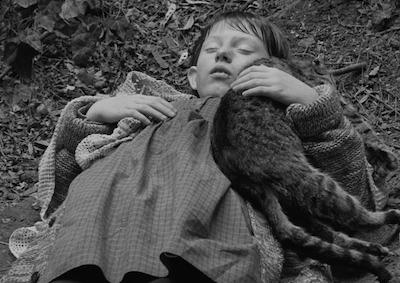UCLA Film & Television Archive is pleased to partner with Arbelos Films to present this modern masterwork in a new restoration as part of its Virtual Cinema programming. Sátántangó will be available for streaming through our exclusive link from Friday, April 24 through Monday, May 4 for $14.99. A portion supports the Archive’s public programs. Members receive a $3 discount—if you’re not a Member, you can join online today!
Sátántangó (Hungary/Germany/Switzerland, 1994)
The film that launched Hungarian director Béla Tarr (Werckmeister Harmonies, The Turin Horse) into the vanguard of international art cinema in 1994, Sátántangó has the unique reputation of being one of the most important and influential films of the last quarter century—that’s also one of the most difficult to see. With a runtime of seven-and-a-half hours, Tarr’s adaptation of László Krasznahorkai’s novel, with Krasznahorkai on board as co-screenwriter, offers a singular cinematic experience, at once challenging and infinitely rewarding. Tarr’s long, fluid shots, Gábor Medvigy’s haunting black and white cinematography and Ágnes Hranitzky’s elliptical editing subsume conventional narrative time and space into something that feels close to living a dream. Tarr and Krasznahorkai’s vision is a dark one, to be sure. Rumors and conspiracies circulate among the last holdouts of a failing agricultural collective smack dab in the middle of a vast, apocalyptic wasteland. As a group of them schemes to make off with the community’s remaining funds, a mysterious, messianic member long thought dead makes his way home, heralding doom with every step. Divided into 12 sections with events told and retold from multiple points of view, Sátántangó is “a cathedral of a film,” according to Sight & Sound, and ranks #36 on its critics’ poll of the 100 Greatest Films of All Time.
Black & white, in Hungarian with English subtitles, 450 min. Director: Béla Tarr. Screenwriter: Béla Tarr, László Krasznahorkai. Cast: Mihály Vig, Dr. Putyi Horváth, Miklós B. Székely.
Watch a trailer:






 Mobile Navigation
Mobile Navigation

